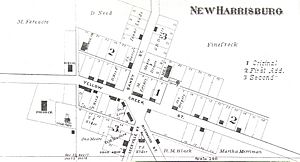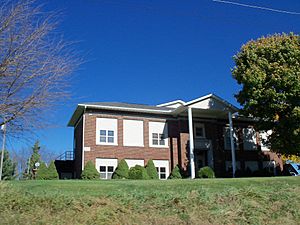New Harrisburg, Ohio facts for kids
New Harrisburg is a small place in Ohio, United States, that isn't officially a town or city. It's located in Carroll County, specifically within Harrison Township.
This community is part of a larger area called the Canton–Massillon Metropolitan Statistical Area, which means it's connected to these bigger cities nearby. The people living in New Harrisburg get their mail through the Carrollton post office, and its ZIP code is 44615. You can find New Harrisburg right along State Route 171.
Contents
The Story of New Harrisburg
New Harrisburg was officially planned out by a person named Jacob Harsh on December 26, 1828. It was set up along an important travel route, a stagecoach line that connected Steubenville and Canton. This stagecoach line was created by Bezaleel Wells, helping people travel between these towns.
Why New Harrisburg Changed
For a while, New Harrisburg grew and did well as a small village. However, things changed when a new train line, the Connotton Valley Railroad, was built. This railroad didn't go through New Harrisburg. When towns are bypassed by new transportation routes like railroads, they often stop growing as much because travelers and businesses go to places where the trains stop instead.
In the early 1880s, Carroll County was thinking about building a new courthouse. A local business owner in New Harrisburg offered ten acres of land if the county seat (the main town where the courthouse is) would move there. But his offer wasn't accepted, and the county seat stayed where it was. By 1920, a writer noted that New Harrisburg no longer had any businesses or shops. It had become mostly a memory for the older people in the county.
Learning in New Harrisburg
Students who live in New Harrisburg attend schools that are part of the Carrollton Exempted Village School District. This school district serves several communities in the area, providing education for local children.
A Famous Person from New Harrisburg
- Jonathan Weaver was a notable person who lived in New Harrisburg during the 1800s. He became a bishop in the Church of the United Brethren in Christ, which means he was an important leader in that church.
 | Bayard Rustin |
 | Jeannette Carter |
 | Jeremiah A. Brown |



